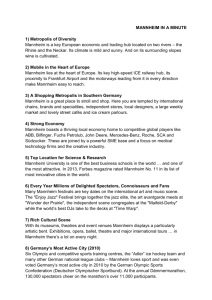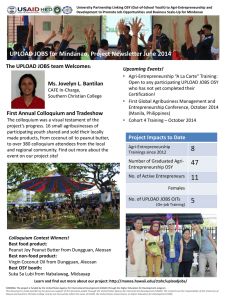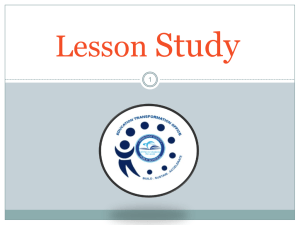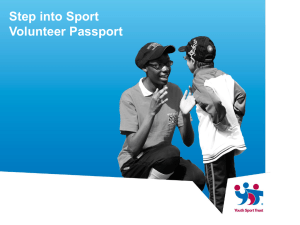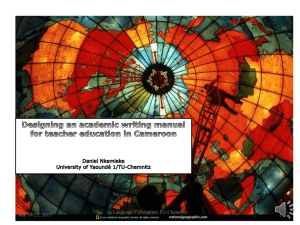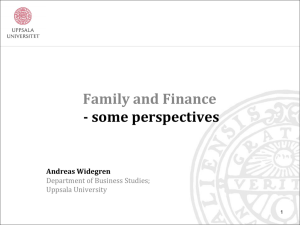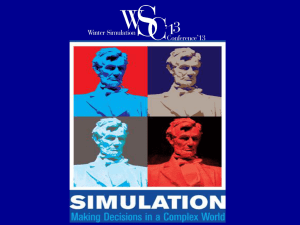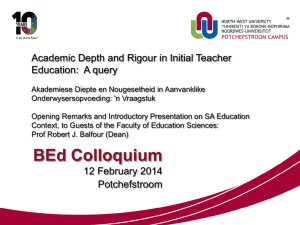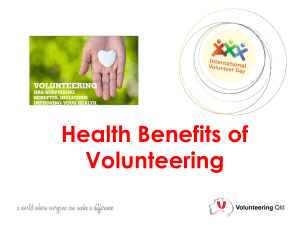Slides are here - Rene Bekkers
advertisement
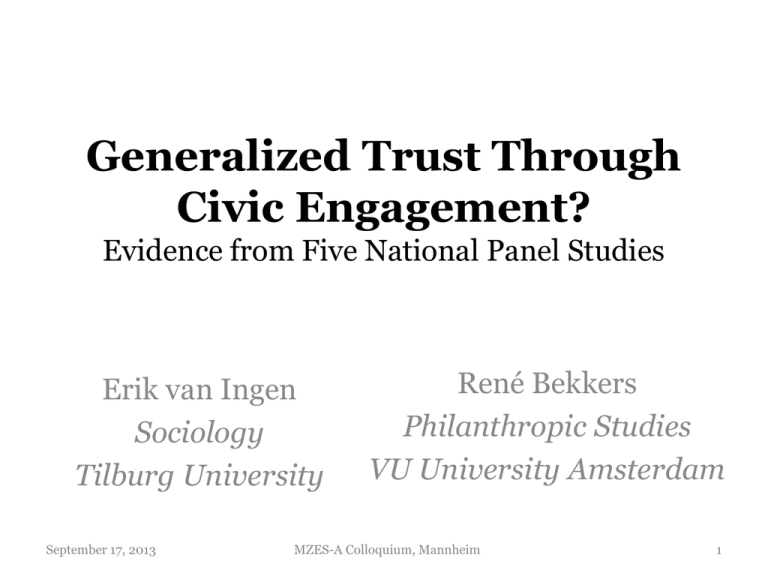
Generalized Trust Through Civic Engagement? Evidence from Five National Panel Studies Erik van Ingen Sociology Tilburg University September 17, 2013 René Bekkers Philanthropic Studies VU University Amsterdam MZES-A Colloquium, Mannheim 1 Our question • What is the influence of civic engagement on generalized trust? – Not: particularized trust, or risky investments in social dilemma situations; – But: the belief that most people can be trusted • Does the level of trust change after people change their involvement in voluntary associations? September 17, 2013 MZES-A Colloquium, Mannheim 2 Additional questions • How long does it take the participation effect to emerge? • Is it robust across countries? • What types of civic engagement make the largest contribution to trust? September 17, 2013 MZES-A Colloquium, Mannheim 3 Why Trust Matters • More trusting societies have lower corruption and crime, and higher participation in elections and economic growth. • More trusting individuals are more satisfied with their lives, have more positive social relations, do better in education and are in better health. September 17, 2013 MZES-A Colloquium, Mannheim 4 Virtuous circles in social capital • “Civic engagement and trust are mutually reinforcing” • “The causal arrows among civic involvement, [..] and social trust are as tangled as well-tossed spaghetti” Robert D. Putnam (2000). Bowling Alone: The Collapse and Revival of American Community. New York: Simon & Schuster, page 137 September 17, 2013 MZES-A Colloquium, Mannheim 5 How it might work • Socialization: Engagement in voluntary associations produces positive social experiences, reinforcing the belief that most people can be trusted. • Contact, peer influence: Engagement in voluntary associations exposes participants to the beliefs of others, ‘risking infection’ with the belief that most people can be trusted. September 17, 2013 MZES-A Colloquium, Mannheim 6 An alternative perspective • Volunteering requires trust. • If you don’t trust fellow citizens to be honest and keep their promises, contributions are wasted easily. • Free riders are distrustors. • Trustors are optimists by nature, and trust doesn’t change much over time. Eric Uslaner (2002). The Moral Foundations of Trust. Cambridge: Cambridge University Press. September 17, 2013 MZES-A Colloquium, Mannheim 7 September 17, 2013 MZES-A Colloquium, Mannheim 8 Data and methods of previous studies • Most studies use cross-sectional data, including a limited set of controls. • Selection and omitted variables are a huge problem here. • Studies using longitudinal panel data have almost all used inadequate regression models. • Selection and omitted variables are still a problem here. September 17, 2013 MZES-A Colloquium, Mannheim 9 The evidence thus far • Delhey & Newton (2003): trust and membership are only weakly correlated in most countries – due to low reliability • Brehm & Rahn (1997): reciprocal influences between trust and membership in US using 2SLS • Uslaner (2002): results obtained from 2SLS not robust in different specifications September 17, 2013 MZES-A Colloquium, Mannheim 10 Collecting better data • D.H. Smith (1966) and Stolle (2003): we need panel data • Claibourn & Martin (2000): no effect of changes in memberships on changes in trust in US panel study of political socialization • Giving in the Netherlands Panel Study includes trust + volunteering questions since 2002 September 17, 2013 MZES-A Colloquium, Mannheim 11 A theory on selection for trust • ‘Interactionism’ in personality and social psychology • Individual differences in trust shape perceptions of contributions to collective goods • Failures to contribute by others are ‘noise’ to trustors; ‘evidence’ for misanthropists • Justification-effects reinforce prior differences in trust September 17, 2013 MZES-A Colloquium, Mannheim 12 As a result… • Trustors are more likely to (be asked to) start volunteering, and less likely to quit • Misanthropists are less likely to (be asked to) start volunteering, and more likely to quit • Trustors may become more trusting and misanthropists may become less trusting as a result of changes in volunteering September 17, 2013 MZES-A Colloquium, Mannheim 13 It’s all about selection! • BTW, note also: – Individuals with larger networks are more likely to be asked to start and continue volunteering – Individuals in better (mental) health are more able to continue volunteering – More happy/satisfied individuals are more likely to help others (and be helped in return) September 17, 2013 MZES-A Colloquium, Mannheim 14 Development of generalized social trust (‘most people can be trusted’) 3.5 3.4 3.3 never quit 3.2 joined sustained 3.1 3 2.9 2002 2004 2006 Bekkers, R. (2012). ‘Trust and Volunteering: Selection or Causation? Evidence From a 4 Year Panel Study’. Political Behaviour, 32 (2): 225-247. DOI 10.1007/s11109-011-9165-x. (open access) September 17, 2013 MZES-A Colloquium, Mannheim Source: GINPS 15 How to get this published… • At APSR, you can suggest reviewers. I suggested a protagonist and an antagonist. • The protagonist googled me, and sent me a (very positive) review by email. • The antagonist said the English language required editing work, asked *basic* questions about the fixed effects model results, and complained that concepts were used inconsistently. September 17, 2013 MZES-A Colloquium, Mannheim 16 Reminder September 17, 2013 MZES-A Colloquium, Mannheim 17 September 17, 2013 MZES-A Colloquium, Mannheim 18 September 17, 2013 MZES-A Colloquium, Mannheim 19 Further evidence: volunteering and charitable confidence in 2006 Bekkers, R. & Bowman, W. (2009). The Relationship Between Confidence and Charitable Organizations and Volunteering Revisited. Nonprofit & Voluntary Sector Quarterly, 38: 884-897. Source: GINPS September 17, 2013 MZES-A Colloquium, Mannheim 20 Selection based on… 0.4 0.3 no controls 0.2 (p < .05) 0.1 0 sustained started quit -0.1 trust and altruistic values base line score on confidence (2004) demographics (p < .05) -0.2 Bekkers, R. & Bowman, W. (2009). The Relationship Between Confidence and Charitable Organizations and Volunteering Revisited. Nonprofit & Voluntary Sector Quarterly, 38: 884-897. -0.3 September 17, 2013 Source: GINPS MZES-A Colloquium, Mannheim 21 The importance of replication • Could the result be particular to the Netherlands? • Or to a selective sample of online panel survey respondents? • Perhaps volunteering doen’t produce trust, but other forms of participation do? • Let’s examine other countries, other forms of participation, other survey modes. September 17, 2013 MZES-A Colloquium, Mannheim 22 New data & additional models • Main source: Swiss Household Panel • Additionally: BHPS, LISS, SHARE, GINPS Hilda • Fixed effects regression • Change score models – Two-wave transitions • Enter / start ( 0 1 ) vs. Stay uninvolved ( 0 0 ) • Exit / quit ( 1 0 ) vs. Stay involved (1 1) September 17, 2013 MZES-A Colloquium, Mannheim 23 September 17, 2013 MZES-A Colloquium, Mannheim 24 September 17, 2013 MZES-A Colloquium, Mannheim 25 September 17, 2013 MZES-A Colloquium, Mannheim 26 Adequate Testing, Please! • Cross-sectional data are useless here • We need longitudinal data to disentangle causes and consequences of voluntary participation • We should look at how people change over time when they have started and quit volunteering • Halaby (2004, Annual Review of Sociology): controlling for Yt-1 is not enough • Use fixed effects regression models, eliminating variance between individuals • XT in STATA September 17, 2013 MZES-A Colloquium, Mannheim 27 Changes in Trust - Switzerland September 17, 2013 MZES-A Colloquium, Mannheim 28 Changes in Trust – UK (BHPS) September 17, 2013 MZES-A Colloquium, Mannheim 29 Changes in Trust – AU & NL September 17, 2013 MZES-A Colloquium, Mannheim 30 September 17, 2013 MZES-A Colloquium, Mannheim 31 Conclusions • The relationship between participation and trust mainly reflects between-person variance. • Within-person changes in trust are small and not systematically related to changes in participation. • Prolonged participation seems to encourage trust but that change disappears over time. September 17, 2013 MZES-A Colloquium, Mannheim 32 Remaining questions • What makes people trusting of others? We still don’t know. • There is a genetic basis for trust. • As social scientists we should ask: which environmental influences change trust? • Experiences with strangers or friends? • Life events such as completing education, marriage, victimization, divorce? September 17, 2013 MZES-A Colloquium, Mannheim 33 How to get this published… • At AJPS, you cannot suggest reviewers. • Editors and reviewers dislike replications: ‘there is nothing new here’. • Social Networks ‘liked the paper’ but did not want to publish because ‘it is not about social networks’. • Political Psychology accepted the paper with minimal revisions. September 17, 2013 MZES-A Colloquium, Mannheim 34 Reminder September 17, 2013 MZES-A Colloquium, Mannheim 35 Implications • The methods and data used here can be used to test other ‘benefits’ of civic engagement, such as higher subjective well being, better health, lower depression and mortality. • These ‘benefits’ will be quantified in a new FP7 project called ‘ITSSOIN’. • Does volunteering make you happy, bring you a job, increase networks? September 17, 2013 MZES-A Colloquium, Mannheim 36 Further lessons Learn. Be fair. Replicate. Don’t give up. Test adequately. Spread the word. September 17, 2013 MZES-A Colloquium, Mannheim 37 Thanks, says • • • • René Bekkers, r.bekkers@vu.nl Blog: renebekkers.wordpress.com Twitter: @renebekkers ‘Giving in the Netherlands’, Center for Philanthropic Studies, Faculty of Social Sciences, VU University Amsterdam: www.geveninnederland.nl September 17, 2013 MZES-A Colloquium, Mannheim 38
